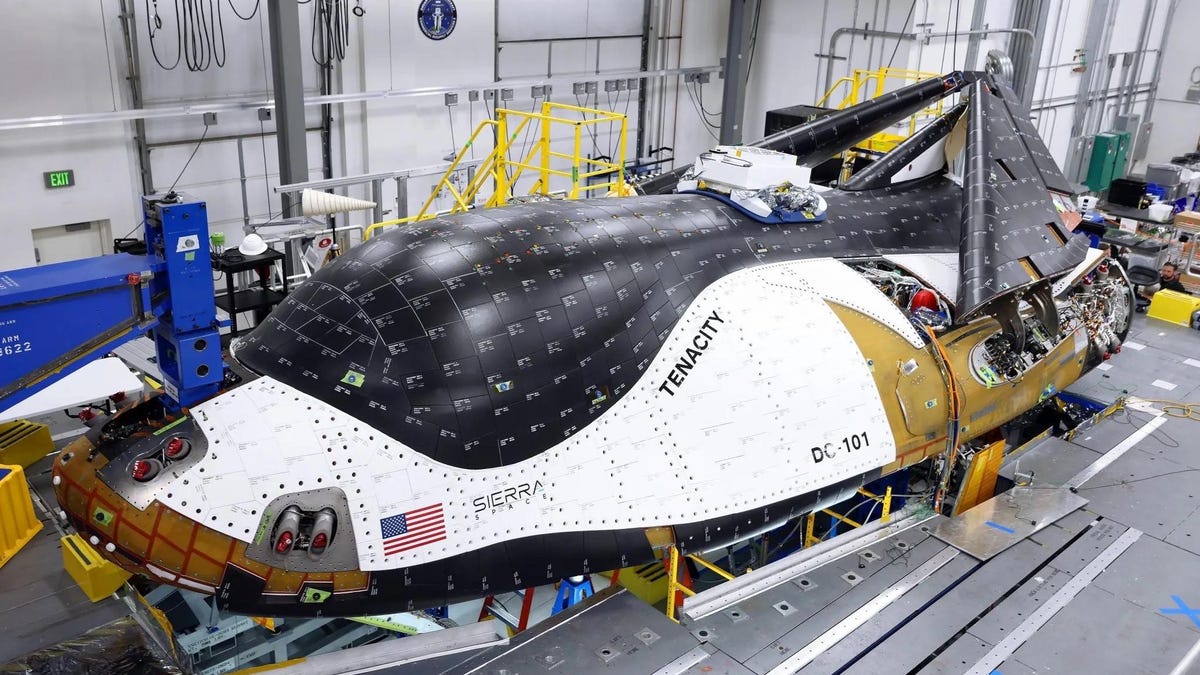Dream Chaser, built by Sierra Space, is being prepped for transport to a NASA facility in Ohio, where it will undergo a series of tests to make sure the spaceplane can survive its heated reentry through Earth’s atmosphere. Starting these tests is crucial, demonstrating Dream Chaser’s readiness for flights and potentially transforming commercial space travel.
Sierra Space is hoping to see its spaceplane fly to the International Space Station (ISS) in 2024 as part of a contract with NASA. The first commercial spaceplane is currently at the company’s facility in Louisville, Colorado, and will soon make the roughly 60 mile (96 kilometer) journey to the Neil Armstrong Test Facility in Sandusky, Ohio, local media outlet Denver 7 reported.
The Colorado-based company was awarded a NASA Commercial Resupply Services 2 (CRS-2) contract in 2016, under which it will provide at least seven uncrewed missions to deliver cargo to and from the ISS. Sierra Space is targeting 2024 for the inaugural flight of the first model of the Dream Chaser fleet spacecraft, named Tenacity, from the Kennedy Space Center in Florida.
At the company’s facility, the spaceplane is finally coming together. “We’re almost done with everything,” Angie Wise, Sierra Space’s chief safety officer, told Ars Technica on Monday. “We’re finishing all the closeout panels. We’re essentially getting it ready for shipping. We’ve checked out the landing gear. We’re going to put everything back in, stow it, and then move it onto the (transport) fixture and get it out of here.”
Tenacity will stay at NASA’s Neil Armstrong Test Facility for one to three months, during which engineers will test the spaceplane’s ability to withstand the vibrations and acoustics of a rocket launch, as well as the temperature extremes it will experience during flight, according to Ars Technica. The spaceplane will be placed inside a giant thermal vacuum chamber. In June, Sierra Space will put its Dream Chaser spaceplane to the test, powering it up for the first time at the company’s test facility.
Dream Chaser is designed to fly to low Earth orbit, carrying cargo and passengers on a smooth ride to pitstops such as the ISS. The spaceplane will launch from Earth atop a rocket, and is designed to survive atmospheric reentry and perform runway landings on the surface upon its return. Sierra Space’s Dream Chaser is designed with foldable wings that fully unfurl once the spaceplane is in flight, generating power through solar arrays. The spaceplane is also equipped with heat shield tiles to protect it from the high temperatures of atmospheric reentry.
Unlike Virgin Galactic’s suborbital spaceplane, Sierra Space designed Dream Chaser to reach orbit and stay there for six months. The U.S. Space Force has its own spaceplane, which wrapped up a mysterious two-and-a-half-year mission in low Earth orbit in November 2022.
The commercial spaceflight industry may not be too focused on spaceplanes as companies race to design fully reusable rockets, but spaceplanes do have an advantage of a smooth landing on their way back down to Earth. In terms of those exact advantages, spaceplanes offer safety, efficiency, operational flexibility, and potential for future commercial opportunities.
For its debut flight, Tenacity will ride atop United Launch Alliance’s Vulcan Centaur rocket. The spaceplane is scheduled for the rocket’s second mission, although Vulcan is yet to fly for the first time due to several delays. The spaceplane is tentatively slated for an April launch, but that still depends on the rocket’s first test flight.
In the future, Sierra Space also wants to launch crewed Dream Chaser missions to its own space station, as opposed to the Orbital Reef space station, which it is designing in collaboration with Jeff Bezos’ Blue Origin—a relationship that appears to be in doubt.
For more spaceflight in your life, follow us on X and bookmark Gizmodo’s dedicated Spaceflight page.

